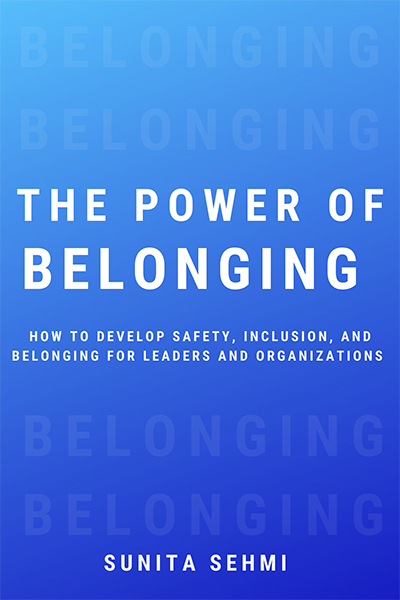This book is for anyone who wants to achieve better personal and organizational effectiveness and fruitful business relationships. It is designed to give both the theoretical knowledge and the tools for action to change your organization’s power dynamics. To operate in a global environment that is increasingly relational than transactional, it is vital to cultivate globally competitive leaders to deal with ongoing change and challenges. The Power of Belonging addresses these challenges leaders face, both when influencing and achieving organizational goals. This is also a book for individuals because we cannot define ourselves by single dimensions—we are a synthesis of our backgrounds, experiences and philosophies. Thus, the most challenging lesson to learn is that belonging will remain a puzzle until we find that it has a unique dwelling place—that we must first profoundly belong to ourselves. So are you ready to be a change agent? Great then this book is for you!
Thrive Global invites voices from many spheres to share their perspectives on our Community platform. Community stories are not commissioned by our editorial team, and opinions expressed by Community contributors do not reflect the opinions of Thrive Global or its employees. More information on our Community guidelines is available here.
By
- Sunita Sehmi, Executive Leadership I Inclusion & Belonging Advisor I Author I Speaker I Mentor at Walk The Talk

Successful management in a contemporary setting demands a select type of competency and necessitates a very distinct skill set. Being mindful and modifying your authority style is the key to success. I genuinely believe that intuition is an incredible source of wisdom that everyone can appropriate. The pure delight comes when we develop it and have faith in its direction.
Nevertheless, too many of us fail to trust our inner voice. Only when you sincerely heed to your intuition will you gain a more in-depth insight and empathy into others. We just need help with how to access it. Current theories need reviewing and updating, especially as we are increasingly going global, whether or not we physically leave our desk or our country.
We are put on this planet to connect with people. We are social animals longing for connection and relationships.
Building relationships is the key to success. However, building relationships beyond one-time projects and providing value to these clients demands consistent nurturing. Organisations aspiring to achieve sustainable competitive advantage in today’s global economy need a road map of best practices for developing globally competent leaders for several years. Role models are fundamental, even though the messages may be subliminal. The influence of parents, family members, teachers and peers are vital. These have more impact than statistics, and we have become a hostage to data, and if it doesn’t make statistical sense, we reject the idea. Hence the way forward is to move away from data dashboards and focus on experiential diversity learning. Accordingly, making the panel come alive and how they can provide relevant information is imperative.
What is the difference between a group and a team?
The least amount of interdependence characterises a workgroup. Hence, workgroups in an organisational or managerial hierarchy meet periodically to understand and share information.
Teams, instead, are incredibly symbiotic. They prepare work, resolve problems, reach decisions, and examine progress in co-operation of a specific project. Team members need one another to get the job done.
In Leadership: Untapping, the Secret to Regional Wellbeing, Belonging and Resilience, the researchers examine leadership styles and the prominence of psychological contracts they have in the employment relationship and how they influence employee wellbeing. The researchers found that any violations of the psychological agreement could prove damaging to the welfare of the individual, the organisation and the wider community. Conclusions from this empirical evidence recommend that when workplace leadership includes components of the psychological contract, wellbeing, resilience and belonging outcomes emerge, the positive results have important implications for promoting healthy regions and their communities.
(Leadership: Untapping, the Secret to Regional Wellbeing, Belonging and Resilience Geraldine Jones, Kathleen A. Moore, Damian Morgan November 2019).
We now live in an ever-changing world, and our business world is becoming increasingly relational and not transactional. Thus, real connection globally means we have to focus on the whole person, the entire person, the person who shows up and not who we think they are.
One reliable method I always encourage my clients to mirror behaviour to increase rapport. When we imitate the behaviour of those we wish to connect with, we mirror posture, gestures, facial expressions and even breathing. Both verbal and non-verbal characteristics need to be combined to succeed and create natural communication.

Sunita Sehmi, Executive Leadership I Inclusion & Belonging Advisor I Author I Speaker I Mentor at Walk The Talk
I support CxOs, senior execs and their teams to foster exceptional leadership and inclusive practices. My clients include McKinsey, CERN, Gavi, IMD Business School, Meta, Novartis, and TikTok. My rich and diverse Indian, British and Swiss background allows me to profoundly understand the global complexities of organisational life. My mission is to help organisations build a culture of belonging where everyone feels valued, seen, heard, respected and understood.
An avid writer, I am a content provider for Forbes Magazine & Thrive Global in my free time. In addition, I am also the author of How To Get Out Of Your Own Way and The Power of Belonging – A Guide For Leaders. I am a pro-bono Mentor for the Richard Branson Centre of Entrepreneurship in my free time.
Share your comments below. Please read our commenting guidelines before posting. If you have a concern about a comment, report it here.








